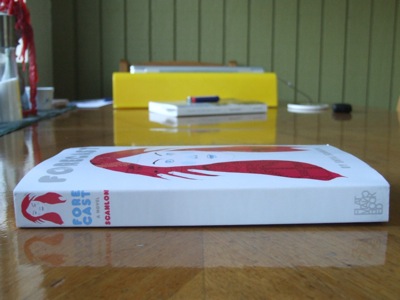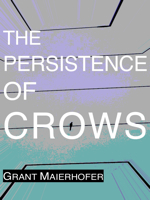[1]
Dystopian fiction comes with a voluntary checklist. Far from citing every bullet point, here are the ones that stand out in my brain as I shave my sideburns and think about Shya Scanlon’s debut novel, FORECAST:
1. There’s usually some kind of remote and inaccessible Eye watching over everything.
2. There’s usually some kind of underground world.
3. There’s usually some cataclysmic change, the end of an era.
4. There’s usually a fancy drug to zombify the populace.
5. There’s usually a Government relentless in its efforts to usurp individuality.
6. There’s usually a heightened sense of paranoia.
7. There’s usually a talking animal.

And FORECAST does an excellent job satisfying this checklist:
1. The remote and inaccessible eye is called Citizen Surveillance, or CS.
2. The underground world has office buildings, streets that only the police can drive on (everyone else must walk), and a dilapidated amusement park full of drug addicts.
3. The cataclysmic change is the dimming of electricity.
4. The fancy drug is REMO.
5. The Government slowly augments its army and sways brains when it’s not keeping them blissfully sedated.
6. Paranoia abounds so much so that many people wear the same AS-Masks for anonymity.
7. The talking animal (& comic relief) is a dog named Rocket:
“‘The world is just such a beautiful place!’ Rocket said in his refreshingly sarcastic voice. ‘Can we get going? There’s much to be pissed on.'”
[2]
Without wanting to give away too much and spoil for you this fantastic adventure, let me just say that the main character’s name is Zara/Helen.
Interchanging chapters between Zara and Helen, between Past and Present, the progression of counterpart chapters keeps things very alive and very complete. An entire world is being created in FORECAST. Every shape, color, shade, and brushstroke is there to see, nothing is hidden, not even the metaphysical framework, which is Maxwell Point, the CS agent in charge of watching Zara and also the narrator of this genre-bending tale.
While slowly deconstructing the bizarre relationship between Zara (aka Helen) and her nearly omniscient protector, Maxwell, Shya Scanlon creates a futuristic world that is hauntingly engaging, often profound, and lyrical. The combination makes for plenty of suspenseful pages alleviated only by his sweet-sounding prose, which, more often than not, I was tempted to bite into and chew. But this isn’t surprising.
FORECAST is his follow-up to IN THIS ALONE IMPULSE, a thin book of 7-line poems that pushes the elasticity of syntax to the outer reaches of the universe. Although not to the extent of ITAI, in FORECAST there are still remnants of a Shya Scanlon who shapes language how he wants.
It is with this linguistic toolbox that Shya Scanlon constructs his vision of Seattle ~200 years in the future, a time when electricity is scarce and nature is quick to conquer abandoned sectors:
“The exposed steel, concrete, and seafoam-green glass that by some sinister anaesthetic manipulation had been built in the years before the blackout into every single architectural eruption, now stood emotionless before this spectacle, supporting enormous billboards blaring the week’s releases while, from the floors above them, vines cascaded out of windows, cut short before they disrupted the display, then withering back upward like sneering lips. The city had hollowed out this tunnel to ignore the world around, and it required a muscle in perpetual flex, pushing outward against the impending greenery that had crept so far, come so close to completely reclaiming the region it once defined.”
But even without these lucid descriptions, at its barest FORECAST has a knockout-punch storyline that can be enjoyed on many levels. It all depends on how much you want to let it fuck with your mind.
[3]
I’m just going to come out and say it loud and clear, totally prepared for the consequences: Maxwell, the narrator, is Shya Scanlon, the writer. Shya Scanlon is Maxwell.
This is exciting because Maxwell isn’t omniscient. When not in front of his CS screen, Maxwell has no insight into Zara’s life. He’s handicapped, kind of how a lot of people feel today when they aren’t close to the internet.
But more interesting than that, by limiting the power of his narrator, Shya Scanlon in turn hints at the impossibility of the writer knowing everything that goes on in the world they’re creating.

I can see Shya sitting hermetically in front of the tiny screen in the back of his brain, watching Zara live her life separate from him but oh so entwined. Kind of like Jorge Luis Borges dreaming his characters one strand of hair at a time. I can see Shya falling in love with Zara, his heart ringing with tenderness as she does small and beautiful acts only those close to her can fully relish. Some of these acts he makes a point to remember, and then he records some of those on paper, and this record, 7 years later, became FORECAST. Of course, there is a great cost involved in this kind of process, this hardcore dedication to the phantoms in his imagination:
“But it was as if the time I’d put into recording [Zara’s] story were time away from creating my own, and her loss meant I had to look right into that absence and come to terms with a life I’d all but left to the automatic mechanisms of living. I had no hobbies, no interests. What had I been, “before?” I couldn’t even remember.”
Maxwell says this, but it could just as easily have been Shya Scanlon. That said, if read a certain way, it becomes apparent that FORECAST succeeds at exposing the craft and emotion of the prose artist with light and graceful feet:
“Sometimes you’re lucky. You’re lucky or you’re just damn good, or both. Sometimes you’re inside their head in ways they don’t even understand themselves, speaking with their mouth to tell you things they didn’t even know, or don’t and likely won’t ever. Sometimes you’re so far inside them you can’t tell the difference, anymore, between yourself and your watchjob.”
Shit, I feel like FORECAST almost does too good of a job. If Shya Scanlon were a magician, his lightly-veiled manifesto about a writer’s most precious tricks would’ve made some people frown and say, “You ruined it for the rest of us!”
But it’s also life-affirming for writers, his sensitive understanding of our brains. It stirs our nerves.
[4]
Alas, all my positives can’t come without a balancing negative. It seems as though the general consensus these days is that new literature has to include something about the internet. On the surface, this seems to make sense. After all, most young writers today spend a non-negligible amount of time stuck to a computer screen, involved in some kind of electronic interaction. Emails and online chats have long ago become a part of society.
While I can see how this evolution in literature came about, I can’t say I like it. I really don’t care to read online chats. Emails, like letters, are passable, but only when absolutely necessary. This is my opinion. It probably isn’t yours, and that’s fine.
But for Shya Scanlon to explain the origin of Zara’s alter-ego, Helen, and how Helen and Jack became an item, through an online chat is, at least for me, the Achilles heel of FORECAST.
Even a narrative of the chat would’ve worked better than the actual transcription. After reading ~300 pages on the edge of my seat, wondering why and how Zara became Helen, and how Jack ousted Asseem, this online chat was unsatisfying.
Having said that, the explanation of Helen’s genesis isn’t anticlimactic at all, it’s just the way it’s packaged.

FINAL THOUGHT
In publishing Shya Scanlon, Flatmancrooked goes above and beyond its mission statement to promote authors that are “narrative and voice driven, with strong arcs and well-explored protagonists.”
FORECAST is more than a clever plot, even though it works perfectly well as just that and nothing more. In the hands of readers who feel and love and want to learn from others who are living, FORECAST manages to not only cast a tremendous orbital arc dense with fleshy protagonists and secondary and even tertiary warm-blooded specimens, it also guides readers gently to windows that look onto a landscape we’ve seen for so long but never quite questioned so much or understood so well.
Apart from all that, the very end made my sideburns tingle, and I don’t have very long sideburns.
MY RATING = ![]()
![]()
![]()
![]()
![]()








